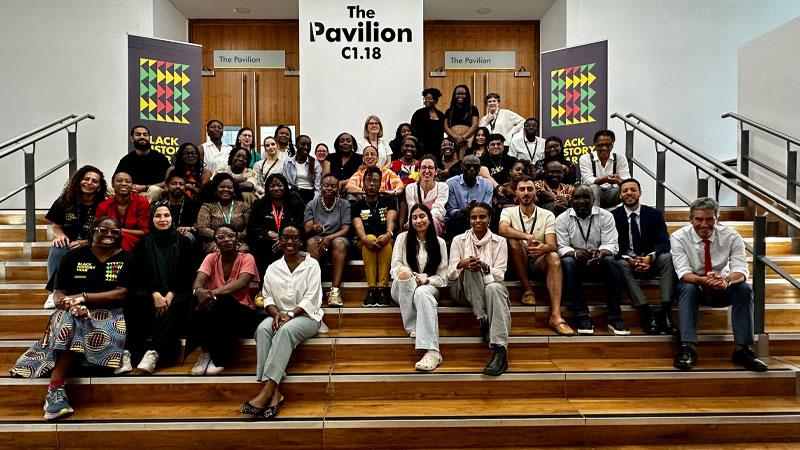Westminster’s Black History Year (BHY) Researchers Network hosted its first Amplifying Black Scholarship conference to shine a light on the exceptional contributions of Black researchers at the University.

On 18 June, attendees from universities across London gathered for the first annual Amplifying Black Scholarship conference hosted by Westminster’s BHY Researchers Network. The conference featured presentations from Black researchers at the University, including doctoral researchers and academics, in addition to a keynote address by Professor Louise Owusu-Kwarteng from the University of Greenwich.
The Researchers Network is an initiative of the University’s Black History Year (BHY) programme dedicated to addressing the inequality faced by Black researchers by providing essential support for Black academics. This includes tailored training sessions and writing retreats focused on developing research and grant writing skills.
The conference was hosted by Dr Deborah Husbands, Reader in Psychology, Co-chair of both the University’s Equality, Diversity and Inclusion (EDI) Committee and Black and Minority Ethnic (BME) Colleague Network and lead for the Black History Year programme, who introduced a series of welcome addresses from Westminster colleagues. This began with Professor Andrew Linn, Deputy Vice-Chancellor for Research and Knowledge Exchange, who kickstarted the BHY programme five years ago to ensure that the University’s celebration of Black history is not relegated to a single month each year.
This was followed by opening remarks from Westminster’s Vice-Chancellor and President Professor Peter Bonfield, Deputy Vice-Chancellor for Global Engagement and Employability Professor Dibyesh Anand, and Chair of the University’s Court of Governors Professor Lynne Berry, who all reiterated the importance of coming together to amplify minority voices.
Professor Louise Owusu-Kwarteng then took to the floor for the conference’s keynote speech titled Keep on Talkin’: Amplifying Our Voices and Authenticity through Our Research. Professor Owusu-Kwarteng shared her journey to becoming a Professor in Applied Sociology and Associate Dean for Student Success in the Faculty of Liberal Arts at the University of Greenwich, discussing the challenges she has overcome and recognising those who helped her along the way.

Professor Louise Owusu-Kwarteng
Doctoral researchers from Westminster’s Graduate School then delivered presentations on their thesis topics, starting with Isang Emeneka who spoke about her Psychology PhD research titled A Cross-Cultural Analysis of Music-Evoked Autobiographical Memories. This was followed by Naa Engmann from Westminster Business School (WBS) who presented on Examining Employee-Generated Content in Brand Crisis Recovery, before Clare Williams from the Centre for Social Justice Research showcased her work on Silenced Sisters: Incredulity and Integrity in the Reception of Black British Women’s Testimony.
Emamuzo Idegbesor from the Research Centre on Peripheral Populations then presented research on Addressing Women’s Contribution to Family Business Dynamics in Nigeria, before the doctoral presentations were finished up by Centre for Research and Education in Arts and Media (CREAM) researcher Mary Martins with a discussion of her thesis titled An Animated Journey of Decoloniality: A Case Study of Resistance through the Carnival of Salvador and the Carnival of Lagos.
The audience then heard from academics across Westminster’s colleges and schools about a diverse range of current research projects. Firstly, Dr Yaz Osho, Principal Lecturer and Director of Academic Professional Development at Westminster's Centre for Education and Teaching Innovation (CETI), spoke about her research on Black scholars: Line Management, Promotion and Opportunity.
Julia Toppin, Senior Lecturer in Music Enterprise and Entrepreneurship, followed with a presentation titled Harnessing my Energy: A Black Woman’s Journey through Film and Television, which looked at the underrepresentation of Black women in film and television.
The academic presentations were wrapped up by WBS colleagues Lecturer Deborah Rose, who explored her current research on The Big Idea: Thought-Led Branding for a Post-Eurafrican World, and Senior Lecturer in Marketing Dr La Toya Quamina, who discussed The Disrupted Classroom: Strategies for AI Integration in Higher Education.
To conclude the conference, Professor Mykaell Riley, Director of Westminster's Black Music Research Unit (BMRU), delivered closing remarks reflecting on the importance of supporting Black researchers.

Professor Mykaell Riley
About the conference, Dr Deborah Husbands said: ‘We are incredibly proud of how far the BHY programme has come. Not only is this a sustained initiative, but the BHY Researchers Network speaks to its expansion as a credible and impactful intervention that delivers benefits for a potentially marginalised population of the research community. Our decision to showcase the work of Black researchers at Westminster was deliberate: we are sending a clear message to the sector that we are research-active and, at the same, continuing to address disparities in this area. We are already planning the next conference since there are more areas of new knowledge coming out of Westminster than one conference can deliver.”
Professor Andrew Linn added: "Focused and practical support for our Black researcher colleagues is a no-brainer. It is a fact that it is more challenging for Black researchers to publish in influential journals and to gain funding for their research endeavours than it is for researchers from other backgrounds, and we just can’t just accept that at Westminster. That support is at the heart of the network, but it leads to great, distinctive research, and the conference was about sharing and celebrating that. Black Westminster researchers are multidisciplinary, but they have a distinctive voice, and we will be sure to hear that voice more often and more loudly in the months and years to come.”
The conference and Westminster's BHY Researchers Network directly contributes to the United Nations Sustainable Development Goals (SDGs) 4: Quality Education and 10: Reduced Inequalities. Since 2019, the University of Westminster has used the SDGs holistically to frame strategic decisions to help students and colleagues fulfil their potential and contribute to a more sustainable, equitable and healthier society.
Find out more about the Black History Year programme at the University of Westminster.









